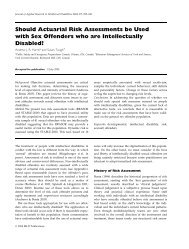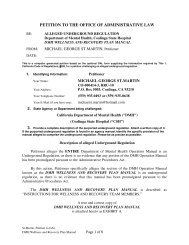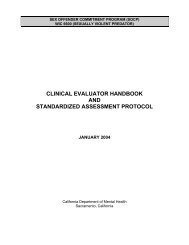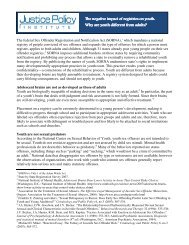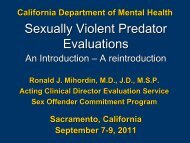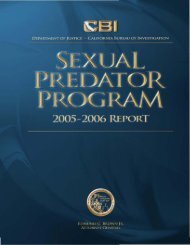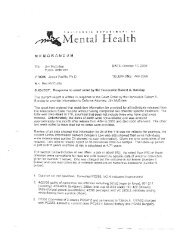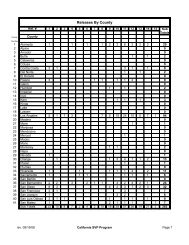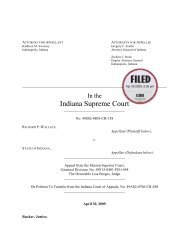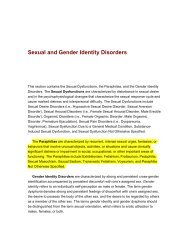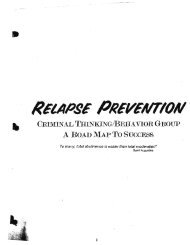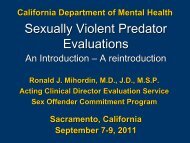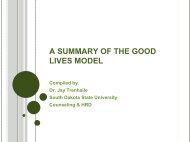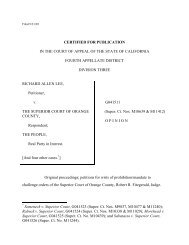In so doing, public policy and discourse of public policy n252 may now focus on pure social defensethrough containment rather than on providing help to those in need. n253 Mental health workers willbecome predictors of future violence and jailers of individuals considered dangerous, rather than treatingpresent illness and helping individual change <strong>for</strong> the better. n254The Hendricks decision signaled to the states that the Court will uphold virtually any law that statelegislatures might enact to control sex offenders. n255 Consequently, public policy toward sex offendersmay become even harsher. n256 Most states have increased criminal sentences <strong>for</strong> convicted sex offendersand [*411] more sex offenders are actually serving longer prison terms. n257 Some states have passedmandatory life sentences <strong>for</strong> certain sex offenders. n258 Public resources that could have been spent onpreventing sex crimes may now be spent on punishing those who commit them. n259VII. Rethinking <strong>Therapeutic</strong> <strong>Jurisp</strong>rudenceTJ analysis is frequently useful as a supplementary analysis when applying other primary doctrines. Forexample, in upholding the Kansas predator law, the Hendricks majority concluded that the purpose andeffect of the statute was not punitive. n260 Because the Kansas law had only been operational <strong>for</strong> a fewyears be<strong>for</strong>e reaching the Court, the majority generally relied on <strong>for</strong>mal indicators (such as where theresidents were housed, who employed the staff, whether treatment programs were available n261 ) toascertain whether the law's purpose and effect was punitive. If the Court had found that it was punitive, itwould violate the ex post facto and double jeopardy prohibitions in the United States Constitution. n262TJ analysis would surely be relevant to such constitutional scrutiny of other state predator laws.In voting to uphold the Kansas predator law, Justice Kennedy expressed concern that sexual predator lawsmay "become a mechanism <strong>for</strong> retribution." n263 Traditional TJ analysis might, in the future, persuadeJustice Kennedy, other Justices in the Hendricks majority, or perhaps other courts consideringconstitutional challenges to other predator laws, that a particular predator law had become a retributivemechanism and should be struck down on Constitutional grounds. [*412]But, what if no court is willing to take this step, even if the challenge is to a law that is violently anddeliberately antitherapeutic? n264 Must TJ remain normatively neutral? As Professor Wexler argues, doesTJ simply "set the stage" <strong>for</strong> resolving value questions? n265 If it limits its roles to empirical assessmentand description of those findings, then a TJ analysis may actually encourage some lawmakers and thepublic that the laws are having precisely the punitive effect intended. Even worse, TJ might demonstratehow to make the law more punitive and antitherapeutic.Robert Cover has noted how pejorative legal rhetoric empowers prosecutors, judges, and juries to justifythe terrible violence they inflict on other human beings. n266 For example, in sentencing a convictedcriminal defendant Professor Cover notes: "Beginning with the broad interpretive categories such as 'blame'or 'punishment,' meaning is created <strong>for</strong> the event which justifies the judge to herself and to others withrespect to her role in the acts of violence." n267 In using these words to describe and justify her actions,Professor Cover requires us to acknowledge that real violence is thereby being inflicted on the defendant.As he says: "For as the judge interprets, using the concept of punishment, she also acts-through others-torestrain, hurt, render helpless, even kill the prisoner." n268 In many ways these laws, also, are usingwords like "predator," "commitment," and "treatment" to justify the infliction of indefinite pain andrestraint on offenders who have served their full prison terms. It will be ironic and sad if TJ, a movementdesigned to improve the human condition provides assurance to policy-makers that they have, indeed,succeeded in inflicting pain and violence on others.TJ now must explore whether it can generate is own approach that articulates broad principles limiting theamount of psychological harm law may inflict on others and, if possible, broad principles requiring whenlaw must have positive psychological effect. n269 [*413]VIII. Future Directions <strong>for</strong> TJ
TJ must develop a normative philosophy and rhetorical strategies <strong>for</strong> responding to a law whose goal isexpressly antitherapeutic. TJ must move beyond simply contributing a perspective from which publicpolicyanalysis can evaluate such a law and its impact on intended and unintended targets. As noted earlier,TJ must set limits on how much psychological harm law may inflict. n270 Though acknowledging thatother values are important and, in some cases, may over-ride TJ values, TJ must not accept that othervalues can always "trump" TJ values.Undertaking descriptive and empirical analyses that in<strong>for</strong>m policy-makers on whether a law isaccomplishing its intended goals is an important contribution. This research may be used to improve thelaw. To take sexual predator laws as an example, expanding the empirical research to include how the lawimpacts others not targeted <strong>for</strong> harm may persuade policymakers to change the law. n271 Thus,researchers might demonstrate that the costs of enacting and implementing a predator law are enormousand divert scarce resources away from more effective crime control strategies. n272 It might demonstratethat the predator law inhibits treatment <strong>for</strong> other sex offenders. n273 Perhaps studies would show thatthese laws create excessive fear and anxiety in the community at large, generating a sort of sex offenderparanoia that inhibits a sense of community and freedom. n274 Making this empirical case may besufficient to persuade policy makers to eliminate or change the law, but this approach accepts that TJ issimply one set of values among many. Policymakers are free to weigh TJ values along with others.In extreme cases, however, TJ must become normative and claim primacy. It must establish a framework<strong>for</strong> setting limits on the law's antitherapeutic impact. One approach would be to explore whether law is soantitherapeutic that it has become psychologically destructive of essential human qualities.For example, as demonstrated above, n275 sexual predator laws may have an extremely negative impacton staff at facilities where <strong>SVP</strong>s are confined. Philip Zimbardo conducted experiments in which two dozenyoung men were randomly chosen to serve either as guards or as prisoners in a simulated prison. n276Designed to understand what it means to be a prisoner or a guard, Zimbardo and his colleagues stopped theexperiment after only six days because the results were [*414] "frightening." n277 "Guards" could nolonger differentiate between role-playing and reality. n278 Their life experience and values gave way andthe "ugliest, most base, pathological side of human nature surfaced." n279 Likewise, the "prisoners"became "servile, dehumanized robots who thought only of escape, of their own individual survival and oftheir mounting hatred of the guards." n280 Thus, a law may so destroy basic human attributes that the riskto those subject to it or required to implement it should not be tolerated.As we have seen, residents confined at the SCC are treated just like prisoners and in some cases even worsethan prisoners. n281 Unlike most prisoners, however, their confinement is indeterminate. Release, so far,is unlikely. It may be difficult to remain a human being in such circumstances. There is also strongevidence that the staff at the SCC have on many occasions treated SCC residents abusively. n282 A lawthat elicits such behavior from human beings ostensibly assigned therapeutic roles raises such questions.Another interesting approach <strong>for</strong> future development would be to focus on how harmful the deliberateinfliction of pain and suffering can be on those who inflict it. There is some interesting social scienceresearch indicating that persons who discriminate against others on the basis of race or similarcharacteristics are themselves damaged by their own behavior. n283 Though they were not sophisticated,some of the studies relied on by the Supreme Court in Brown v. Board of Education, n284 indicated thatsegregation adversely affected not only those who were the targets of segregation laws, but were "evenmore detrimental to the emotional well-being of the prejudiced person than those who are the objects ofdiscrimination." n285 It may be that the rage directed by society against criminals, especially sexoffenders, as implemented by law may harm society itself. Thus, law may also be destructive of socialintegrity.This may be especially worth considering if, as Professor Simon so cogently argues, n286 society is nowusing the law as a managerial strategy to [*415] incarcerate "evil" and high-risk groups who will not berestored to the community. This "populist punitivism" n287 may pose a special risk of encouraging social
- Page 3 and 4: This Article will demonstrate that
- Page 5 and 6: In its findings, which were enacted
- Page 7 and 8: esidents cannot use the SCC grievan
- Page 9 and 10: In her reports, the special master
- Page 11 and 12: shortly after the law went into eff
- Page 13 and 14: The Kansas experience confirms that
- Page 15 and 16: There is minimal trust between staf
- Page 17: For example, to satisfy its concern
- Page 21 and 22: n6 David B. Wexler, New Directions
- Page 23 and 24: n34 See, e.g., Wash. Rev. Code § 7
- Page 25 and 26: n58 See DSM-IV, supra note 30, at 6
- Page 27 and 28: n82 See Thirteenth Report of the Sp
- Page 29 and 30: n110 Eleventh Report of the Special
- Page 31 and 32: commitment. See Wash. Rev. Code Ann
- Page 33 and 34: n171 See, e.g., Briefs of the State
- Page 35 and 36: and the bond formed between them. T
- Page 37 and 38: in predatory acts of violence if no
- Page 39 and 40: deprives one charged with a crime o
- Page 41 and 42: Time of Request: Wednesday, July 04



